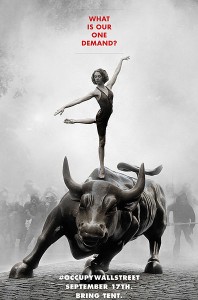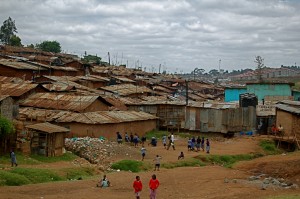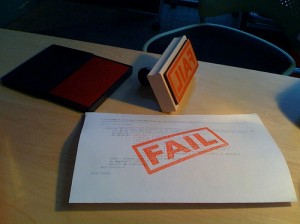Justice
Ms. Maathai's life and work are examples of the truth of the adage, "Nothing is more powerful than a made up mind." She made up her mind that planting trees is a way to make life better for rural women and for all of humankind. She wanted to plant one tree for every person in Kenya. An the Green Belt Movement has planted tens of millions of trees.
This Sunday (Oct. 9) , Sesame Street will introduce a brand-new Muppet character — a magenta-faced, impoverished 7-year-old named Lily who represents one of the 17-million Americans who struggle daily with hunger and poverty — during a rare prime-time special called, "Growing Hope Against Hunger."
From the official statement by #OccupyWallStreet: "As one people, united, we acknowledge the reality: that the future of the human race requires the cooperation of its members; that our system must protect our rights, and upon corruption of that system, it is up to the individuals to protect their own rights, and those of their neighbors; that a democratic government derives its just power from the people, but corporations do not seek consent to extract wealth from the people and the Earth; and that no true democracy is attainable when the process is determined by economic power."
Scripture constantly should be challenging our assumptions about our lives and in every aspect of society. Transformation is needed on a personal and also a political level. Scriptural priorities shouldn't be glossed over in order to protect political ideologies and comfort zones.
If we believe that what Jesus taught remains just as relevant today as it did when he physically walked among us, then it should still be a comfort to those on the margins of society and offensive to the wealthy and powerful. That doesn't mean that the wealthy and powerful can't be good and faithful followers of Christ, but Jesus did warn them that their walk will be a hard one. Wealth and power bring unique and difficult temptations ... If you never feel uncomfortable when you read the Gospels then you aren't paying attention.
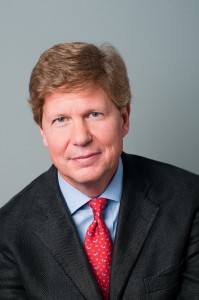 The puzzle here is not that readers of the Bible would tilt toward the political left. That, for me, as well as for thousands of other American evangelicals, is self-evident. Jesus, after all, summoned his followers to be peacemakers, to turn the other cheek, to welcome the stranger and to care for “the least of these.” He also expressed concern for the tiniest sparrow, a sentiment that should find some resonance in our environmental policies.
The puzzle here is not that readers of the Bible would tilt toward the political left. That, for me, as well as for thousands of other American evangelicals, is self-evident. Jesus, after all, summoned his followers to be peacemakers, to turn the other cheek, to welcome the stranger and to care for “the least of these.” He also expressed concern for the tiniest sparrow, a sentiment that should find some resonance in our environmental policies.
No, the real conundrum lies in the subtitle the editors of Christianity Today assigned to Franzen’s article, which was titled, “A Left-Leaning Text.” Adjacent to a picture of a Bible tilted about 45 degrees to the left, the editors added the subtitle: “Survey Surprise: Frequent Bible reading can turn you liberal (in some ways).”
The fact that anyone should register surprise that the Bible points toward the left should be the biggest surprise of all.
[caption id="attachment_34028" align="alignleft" width="214" caption="Detail of a sculpture at the site of a former slave market, Christ Church, Zanzibar. By Cathleen Falsani."][/caption]
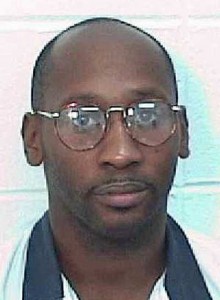 "Continuing a cycle of violence through state-sanctioned actions does not bring justice but only creates a culture of death and retribution. As a pro-life Christian, I believe the execution of Troy Davis shows a failure of moral leadership by both our country and the state of Georgia. The doubt surrounding the case of Troy Davis has served as a wake-up call to many in this country that our justice system is flawed and should not hold the power of life and death over any person. Justice should restore and heal, not destroy." -- Sojourners CEO Jim Wallis statement today, Friday Sept. 23
"Continuing a cycle of violence through state-sanctioned actions does not bring justice but only creates a culture of death and retribution. As a pro-life Christian, I believe the execution of Troy Davis shows a failure of moral leadership by both our country and the state of Georgia. The doubt surrounding the case of Troy Davis has served as a wake-up call to many in this country that our justice system is flawed and should not hold the power of life and death over any person. Justice should restore and heal, not destroy." -- Sojourners CEO Jim Wallis statement today, Friday Sept. 23
Wall Street has been devastating Main Street for some time. And when the politicians -- most of them bought by Wall Street -- say nothing, it's called "responsible economics." But when somebody, anybody, complains about people suffering and that the political deck in official Washington has been stacked in favor of Wall Street, the accusation of class warfare quickly emerges. "Just who do these people think they are," they ask. The truth is that the people screaming about class warfare this week aren't really concerned about the warfare. They're just concerned that their class -- or the class that has bought and paid for their political careers -- continues to win the war.
So where is God in all of this? Is God into class warfare? No, of course not. God really does love us all, sinners and saints alike, rich and poor, mansion dwellers and ghetto dwellers. But the God of the Bible has a special concern for the poor and is openly suspicious of the rich. And if that is not clear in the Bible nothing is.
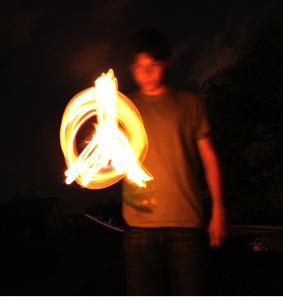 I say a ceasefire can and also ought to mean that we will hold our peace, hold our tongues, intentionally muzzle ourselves, become mute in a discussion that can much too easily descend into verbal warfare. Often, when we are quiet in the face of verbal attack, the argument does not escalate into something that all parties involved will regret.
I say a ceasefire can and also ought to mean that we will hold our peace, hold our tongues, intentionally muzzle ourselves, become mute in a discussion that can much too easily descend into verbal warfare. Often, when we are quiet in the face of verbal attack, the argument does not escalate into something that all parties involved will regret.
So what makes the Troy Davis case stand out from most other death penalty cases?
Serious doubt.
Not about whether the death penalty is the appropriate punishment for Davis or has been correctly applied.
The doubt raised in Davis' case is whether he committed the crime at all. And those questions about his guilt have prompted hundreds of thousands of people to raise their voices in opposition to his execution, most recently former FBI Director William Sessions who, in an op-ed in the Atlanta Journal-Constitution Friday, called on the Georgia Board of Pardons and Paroles to commute Davis' sentence to life in prison.
Did you know 98 percent of poor households in the U.S. (those with an income of about $22,000 or less for a family of four) own a STOVE or OVEN? Or that 84 percent of poor households have AIR CONDITIONING?
Shocking! An outrage!
At least that's what some of our colleagues in the media appear to believe, as Jon Stewart documents in the following "Daily Show" report:
More than 15 percent of the U.S. population now lives in poverty -- the highest rate in 18 years, according to a U.S. Census Bureau report released this morning.
Poverty has risen for the third consecutive year in a row, the new census figures show, with perhaps most distressing are the child poverty numbers, which rose from 20.7 percent in 2009 to 22 percent in 2010.
"The results aren't good," the Rev. Jim Wallis, president and CEO of Sojourners, the largest network of progressive Christians in the United States focused on the biblical call to social justice, said upon reviewing the census report today.
As the tenth anniversary of 9/11 approaches, many of us are wondering how best to honor the many victims of that tragedy and its aftermath.
Here in Cincinnati, my wife Marty's answer is inviting some of our friends to join us on a walk with some Muslim and Jewish families she invited by simply calling their congregations. She got the idea from my friends and me at Abraham's Path, who are sponsoring www.911walks.org to help people find or pull together their own 9/11 Walks all over the USA and around the world. The goal of these walks is simple: to help people honor all the victims of 9/11 by walking and talking kindly with neighbors and strangers, in celebration of our common humanity and in defiance of fear, misunderstanding, and hatred.
Yesterday, the U.S. and Canada celebrated Labor Day, a day honoring workers. What does it mean to honor workers at a time of high unemployment, job insecurity, and the threat of lay-offs? In the U.S., the unemployment rate remains just over 9 percent, with no decrease of the rate in August and the recovery of jobs apparently stalled. As President Obama prepares to deliver his "jobs speech" this week, he faces immense challenges.
In the U.S., the first celebration of Labor Day was held in 1882 in New York City, organized by the Central Labor Union. In Canada, Labor Day can be traced back even further, to when Toronto Typographers went on strike for a 58-hour work week in 1872. Religious leaders, both nationally and internationally, recognizing the sanctity of labor, joined labor leaders in calling for justice for workers. Pope Leo XIII, for example, issued Rerum Novarum (On the Condition of Labor) in 1891, building a biblical foundation for the dignity of the worker.
Each moment is pregnant with new possibilities waiting to be born, alive with new beginnings, God's secrets not yet heard, God's dreams not yet fulfilled. These were the thoughts that lodged in my mind as I meditated on Isaiah 48:6-8 this morning. So many good Christian people I talk to are afraid that their prayer life will become stale, their spiritual disciplines empty rituals. Some make this an excuse for their lack of discipline in prayer. And prayer does become stale and meaningless if we don't know how to stir our imaginations and awaken our creativity to new thoughts, new patterns and new possibilities for prayer.
Tools for prayer are creative opportunities not formulae for success
One of my greatest fears as I continue to share these tools for prayers is that some of my readers will see them as another formula that will make them more successful and more prayerful. Of course that is possible, but what I hope is that we will all see these as tools as ways to stir our imaginations and open our minds to new ways to express the prayers God has placed in our hearts, stimuli that awaken our creativity to the brand new possibilities of ways that God can speak to us, in us, and through us.
Did anyone else get the feeling, as we watched weather reporters wave their arms frantically in swirling motions across oversized maps of the eastern seaboard -- with their eyes bulging as they pushed out whole paragraphs without a single breath for a period -- that this was all hype?
Last weekend, as Irene passed over town after town in the mid-Atlantic, memories of Katrina did not materialize. By the time Irene huffed over New York City on Sunday morning, and the flood of the century was actually just a really big puddle in Battery Park and a floating lifeguard stand in Long Beach, my fear had transformed into complacency. From there I became cynical. By Sunday afternoon I found myself watching the weatherman's bulging eyes as he repeated the mantra of the day: "It's not as bad as we thought it would be, but it's not over." And I thought: "Boy, they'll do anything for ratings."
But it wasn't all hype.
